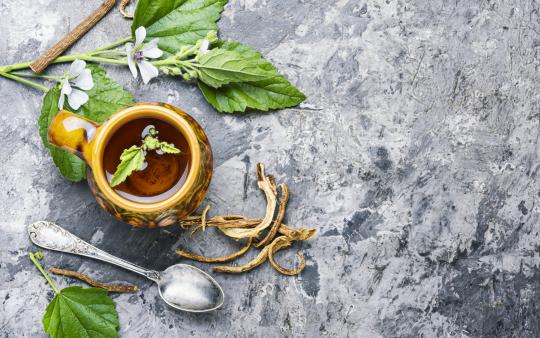It can be heartbreaking when your little one isn’t feeling well. Whether it is due to a tummy ache, constipation, sore throat, or irritability and restlessness, finding a gentle, nourishing solution is always a great starting point. In the absence of a medical emergency, instead of going straight for the over-the-counter medications, why not give these soothing, healing herbal natural home remedies a try? As a bonus, sharing a cup of tea with your child is a lovely ritual to start!
5 herbal teas and their benefits
Herbal teas offer many benefits and are so easy to prepare. Also called a “hot water infusion”, steeping dried herbs in hot water helps draw out the key medicinal constituents. If your child doesn’t like to drink tea, don’t despair! They also prove quite effective when added to a warm bath or used as a compress on the skin! Keep a few select herbal teas on hand to round out your medicine cabinet. To preserve the quality, make sure they are stored in a dark, dry place, away from heat.
Lemon balm (Melissa officinalis)
-
Relieves spasms in the GI tract. Good for general tummy aches.
-
Relaxing. Can help with anxiety or with trying to fall asleep.
-
Hot water extracts have antiviral properties.
-
Adding a prepared infusion to bath water may help combat an influenza infection or chickenpox.1
Chamomile (Matricaria recutita)
-
Relaxes the whole body, helps ease anxiety, and can be used as a calming agent for sleep.
-
Soothes the walls of the GI tract. Good for gas or colic pains.
-
Helps relieve non-infectious diarrhea and constipation.
-
Soothes teething infants when added to bathwater.2
-
Can also be used in the tub to soothe eczema.3
Echinacea (Echinacea purpurea)
-
Enhances the immune system.
-
Great for use during colds or flu.
-
Beneficial for respiratory tract infections, sore throats, and eye and ear infections.
Marshmallow root (Althea officinalis)
-
As a demulcent, it coats and soothes mucous membranes and can be very helpful for a sore throat.
-
Can be used for asthma, especially for kids with “scratchy” dry throats who have an overactive cough reflex.
-
Safety note: Administer approximately 2-3 hours before or after any other medication as it may delay their absorption.
Ginger (Zingiber officinalis)
-
As an expectorant, it can help kids cough up any mucous that is sitting in their chests/lungs.
-
Helps relieve nausea and motion sickness.
-
Promotes sweating during a fever.
Create your own fresh ginger infusion. Simply add a few slices of fresh ginger to a pot with 2 cups of water and allow to simmer, covered, for 10 minutes. Remove from heat and continue steeping for an additional 20 minutes.
How to make water infusions
To brew, add 1 rounded tsp per cup of boiling water. Steep, covered for 10 minutes.
Iced Tea
Add a few ice cubes to cool the tea down and if preferred, sweeten the tea with a little bit of honey.
Tea compress
Allow tea to cool until it is lukewarm. Submerge a clean washcloth into the tea, saturate, then wring out. Gently apply cloth to area experiencing discomfort. Compress can be applied for 20-30 minutes at a time.
Dosing: Generally speaking, ¼ c for children 3-5 years old, and ½ c for those 6-10 years old. By 10-12 years of age, the gastrointestinal tract is usually fully developed, and older children and teens can usually tolerate the adult dose of 1 c. Doses can be repeated once an hour if symptoms persist.
Tea herbs for bath time
Administering herbs in a bath works well for infants and children under the age of three, although is also quite delightful for the older set! Prepare the tea as described above, and add to a tub of warm bathwater. Infants have a large skin surface area compared to their body weight, making skin exposure an efficient vehicle for absorption,1 especially since their gastrointestinal systems aren’t as developed yet.
Caution: These herbs should not be used if your child has an allergy to the Astercaea family of plants/flowers.
For references visit ecoparent.ca/TWF/WINTER2021.
You may also enjoy: Tea Remedies for the Entire Family 5 Herbal Teas to Support Your Child’s Health, and 5 Herbal Treatments to Ease Flu Symptoms.






